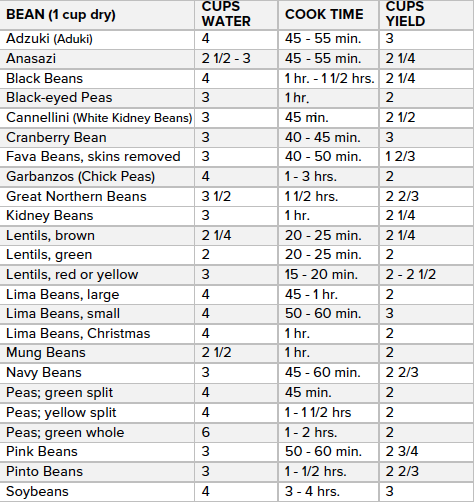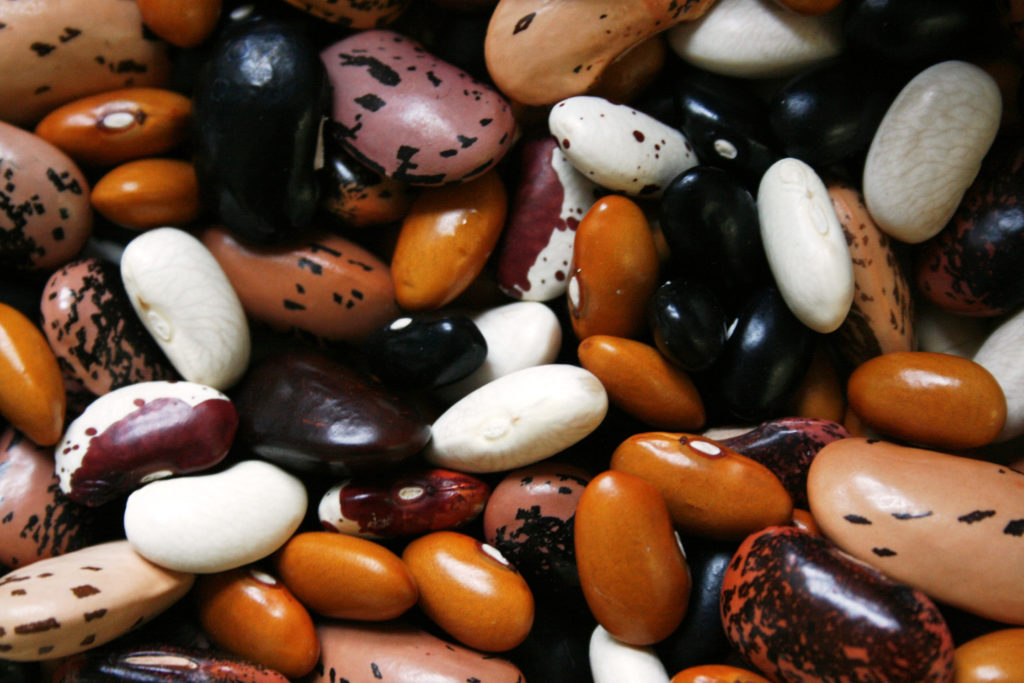Are beans healthy? How much should you eat? How should you include them in your diet? If you’ve ever had these questions, then read on! We lay it all out for you in today’s blog.
Nutrition
Beans are the dried seeds of the legume family, and contain fiber, protein and resistant starch. Resistant starch is different from the starches that cause blood sugar issues, as it resists digestion (as the name suggests!). When foods like beans, rice or potatoes are cooked then cooled, the resistance starch becomes active. Resistance starch passes through the intestines without being metabolized or stored as fat like other starches do. Resistant starch acts like fiber, providing fuel for the cells in our colon in the form of short chain fatty acids (SCFAs). SCFAs, like butyrate, help keep the lining of our intestinal wall healthy, reduce the risk of cancer and have even been linked to an increased metabolism.
Beans are a good source of plant based protein. Black beans contain 15 grams of protein per 170 grams. However, they also contain a lot of carbohydrates, so be aware of your intake if you are a vegan or vegetarian and relying on beans as a protein source daily. Be extra cautious if putting on lean muscle is your goal! Beans lack the amino acid leucine, which is especially important for building muscle. That being said, beans have a great nutritional profile and definitely belong in a well rounded, whole foods and plant based diet.
Beans are also a rich source of a number of vitamins and minerals including Vitamin B6, Folate, Zinc, Iron and Magnesium. Soybeans, peanuts, green peas, and green beans are all in the legume family! We recommend the lower starch varieties of beans like lentils and peas as well as black beans and garbanzo beans (chickpeas). Butter beans and kidney beans are very high in starch, so eat those varieties more sparingly. As for peanuts, be picky about the source! If peanuts are not stored correctly, they can become high in mold.
Benefits of Beans
Beans are high in fiber, so they may reduce LDL cholesterol levels, slow down the rise of blood sugar after eating, improve satiety and regulate bowel movements. Eating beans can also improve the health of the microbiome, as its fiber feeds our beneficial bacteria. Legume consumption appears to help lower the incidence of cardiovascular disease as well, and other studies have found that legumes may help protect against metabolic syndrome and reduce risk of Type 2 Diabetes.
Cautions About Beans
While beans do contain protein, they are mostly a carbohydrate. Much of the carbohydrate content in beans is resistant starch and fiber, but those with blood sugar issues, diabetics or those who struggle with weight loss should limit servings of beans to no more than a ½ cup daily (and stick to lower starch options like chickpeas and black beans) to prevent over intake of carbohydrates in general.
An additional note about beans: they contain phytates and lectins. These compounds are found naturally in plants and act as a defense against predators, but they can cause issues in sensitive individuals when consumed. They act as binders, impeding absorption of nutrients and causing inflammation. Lectins can cause inflammation and damage in the gut lining and they have been linked to increased intestinal permeability and autoimmune disease, so proceed slowly with beans if you have an autoimmune disease or are at risk for one.
Raffinose is one of the sugars in beans and what causes gas in most people. Raffinose is broken down by the bacteria in our intestines and fermented. This fermentation causes gas. This is a perfectly normal process in most people! However, if you have an overgrowth of bad bugs or bugs where they do not belong (like in you small intestine), beans may cause you more digestive discomfort. If you have IBS or SIBO, tread cautiously with beans and try to address the root causes of your digestive issues. Some find that soaking beans before cooking relieves gastrointestinal issues.
How To Prepare Beans
Canned – If eating canned beans, buy BPA free and organic. Rinse very well to reduce the sodium content before eating. Canned beans generally contain preservatives, so just be mindful if you rely on them often. Canned beans make great pantry staples!
Dried – Dry beans are cheaper than canned and may reduce lectin and toxin content if you soak the beans before cooking. We recommend soaking dry beans in water (except lentils or split peas) for 8-10 hours after giving them a good rinse. Add 1 T of apple cider vinegar or lemon juice per cup of beans soaking to further reduce lectins and break down indigestible sugars that may cause digestive discomfort.
Quick Soak Method– Rinse beans first, then place in a stock pot and cover with several inches of water. Bring to a boil for 10 minutes then let soak for an hour before cooking.
Instant pot – Add rinsed, dried beans with 2-3x the amount of water. So, to cup 1 cup of dried beans you’d add 2-3 cups of water.
Generally, 1 cup of dried beans makes 2.5 to 3 cups cooked. Check out the table below for a great resource on how much water/liquid each bean needs as well as cook time. We love cooking beans in bone broth with whatever spices you like or have on hand. Onions, garlic and cumin make great spices to cook beans with!




